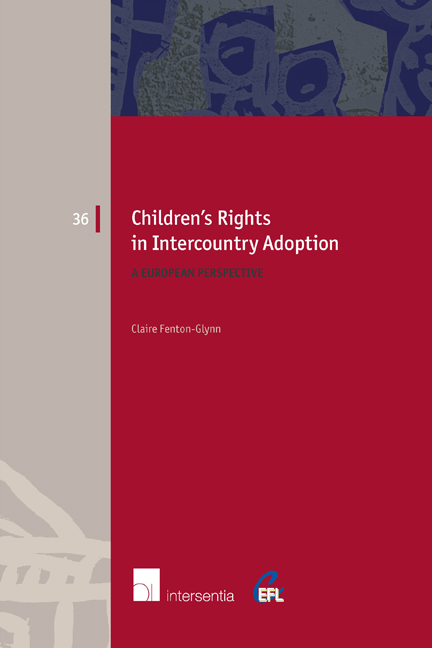Book contents
- Frontmatter
- Dedication
- Acknowledgements
- Contents
- Table of Cases
- Chapter 1 Introduction
- Chapter 2 Combating Abuses: International and Regional Regulation
- Chapter 3 Intercountry Adoption and the Domestic Child Welfare System: The Principle of Subsidiarity
- Chapter 4 Consenting Adults: Giving and Receiving Consent to Adoption
- Chapter 5 Buying Babies: The Inducement of Consent
- Chapter 6 Compulsory Adoption: Adoption Without Consent
- Chapter 7 Child Participation: Autonomy and Protection
- Chapter 8 Adoptive Parents: Eligibility, Preparation, and Support
- Chapter 9 Who Am I? The Child's Right to Identity
- Chapter 10 Conclusion
- List of Legislation
- Literature
- Index
- About the Author
- Miscellaneous Endmatter
Chapter 3 - Intercountry Adoption and the Domestic Child Welfare System: The Principle of Subsidiarity
Published online by Cambridge University Press: 26 November 2017
- Frontmatter
- Dedication
- Acknowledgements
- Contents
- Table of Cases
- Chapter 1 Introduction
- Chapter 2 Combating Abuses: International and Regional Regulation
- Chapter 3 Intercountry Adoption and the Domestic Child Welfare System: The Principle of Subsidiarity
- Chapter 4 Consenting Adults: Giving and Receiving Consent to Adoption
- Chapter 5 Buying Babies: The Inducement of Consent
- Chapter 6 Compulsory Adoption: Adoption Without Consent
- Chapter 7 Child Participation: Autonomy and Protection
- Chapter 8 Adoptive Parents: Eligibility, Preparation, and Support
- Chapter 9 Who Am I? The Child's Right to Identity
- Chapter 10 Conclusion
- List of Legislation
- Literature
- Index
- About the Author
- Miscellaneous Endmatter
Summary
Before considering the substantive aspects of adoption – who must consent to an adoptive placement, how adoptive parents are chosen, what information a child can have access to – we must first look to the place of intercountry adoption in the scheme of child care alternatives, and when it can be considered to be in the best interests of a child to be adopted outside his or her country of origin.
Article 21 of the UNCRC regulates the place of intercountry adoption within the domestic sphere, requiring that it only be considered “if the child cannot be placed in a foster or an adoptive family, or cannot in any suitable manner be cared for in the child's country of origin”. This requirement to consider domestic placements before an intercountry adoption is known as the principle of subsidiarity, and is also contained in article 4(b) of the Hague Convention, which permits an intercountry placement only where the sending state authorities “have determined, after possibilities for placement of the child within the State of origin have been given due consideration, that an intercountry adoption is in the child's best interests ”. Although this formulation is somewhat weaker than that contained in the Convention on the Rights of the Child, referring only to “due consideration” of domestic options, rather than the much clearer imperative in the UNCRC, it arguably has the same import. The Explanatory Report on the Hague Convention confirms that article 4(b) represents an express acceptance of, and obligation to comply with, the subsidiarity principle, and that states must ensure that no domestic or internal measures are available before considering intercountry adoption.
The principle of subsidiarity is one of the cornerstones of the international regulation of intercountry adoption although, as will be seen below, it is not without its critics. The importance of this principle lies in the integration of intercountry adoption into the national child protection system: intercountry adoption cannot be seen as a stand-alone practice, but must be part of a holistic approach to child welfare that recognises that intercountry adoption is simply the last in a line of alternative care options.
- Type
- Chapter
- Information
- Children's Rights in Intercountry AdoptionA European Perspective, pp. 21 - 50Publisher: IntersentiaPrint publication year: 2014

